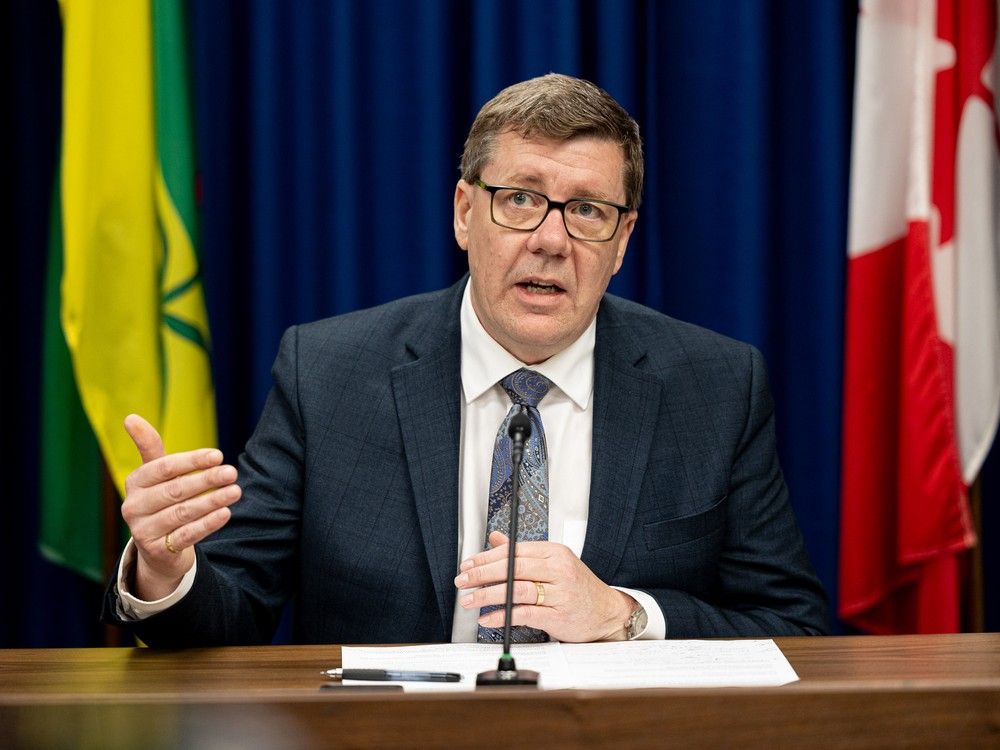Saskatchewan’s premier is standing by Canada’s approach to dealing with American tariffs, while also defending his government’s tariff-response plan. At a media conference Friday morning in Saskatoon, Scott Moe — just back from a trade mission to Europe, where he met with financial and business leaders in the United Kingdom and Germany — weighed in on the events of ‘Liberation Day’ in the United States. The term was coined by U.
S. President Donald Trump, and marked the imposition of reciprocal tariffs on most of the country’s trade partners. Canada, along with Mexico, escaped the imposition of additional tariffs.

The premier reiterated a previous statement that the current strategy of the provinces and federal government, working together in collaboration against U.S. tariffs, is the correct one.
“I wouldn’t say that it’s successful, but I would say that it is seeing a relatively positive outcome,” he said. Moe said a truly successful strategy would see all tariffs lifted and a return to what he called a free and fair trade environment. He added U.
S. tariffs on steel products remain a concern, and highlighted a recent order from a Saskatchewan Crown corporation for steel. Moe said It helped mitigate the economic fallout, and was a positive step by government to help.
In the United States Senate, a bipartisan bill has been introduced which would require congress to approve any new tariffs. One of the co-sponsors is Iowa Senator Chuck Grassley, who Moe has met with during trips to the U.S.
The premier believes the lobbying done by Saskatchewan, along with others, had an impact on Grassley and helped put Canada in a better spot. “Not the best position, but a far better position than many other countries around the world,” he said. The premier also highlighted that Canada is a signatory to a number of other trade agreements involving countries that are not currently looking to put up barriers.
This includes countries like India and Vietnam. He added trade can also be done outside any formal agreement. Moe said the negative impact caused by U.
S. trade barriers creates potential for Canada and Saskatchewan to step in and fill voids created by tariffs. “There are going to be opportunities that arise in that,” he said.
Chinese tariffs on Canadian canola meal and oil remain in place and are an issue. Moe said he has been in communication with Prime Minister Mark Carney about the issue. He said Carney has pledged to reach out at the highest levels to help resolve the dispute.
“We need that engagement from the federal level. From my understanding (that) has not occurred yet, so I ask for it again, ” he said. Moe added the province has itself reached out to China’s ambassador to Canada, along with Canada’s ambassador to China, to help resolve the dispute.
He said the 100 per cent tariffs on value-added canola are a major concern. “The biggest and most significant and urgent challenge that we face when it comes to the tariff conversation is not the United States of America. It is China,” he said.
The province’s opposition said they are looking for the government to do more in the face of the American tariff threat. After Moe’s media conference Kim Breckner, the NDP critic for trade and export development, scrummed with media outside the Saskatoon Cabinet Office. Breckner said while Canada and Saskatchewan dodged a worse outcome, there is still concern.
“People are still worried,” she said. Breckner called on the government to push for the expansion of trade-enabling infrastructure like expanded pipeline capacity and highway improvements. She added the opposition supports efforts to find new markets for exports, so Saskatchewan is not so dependent on the U.
S. The NDP critic also called for the creation of supports for workers impacted by tariffs. “We need to invest in a new future for Saskatchewan,” she said.
.
Politics

Scott Moe talks 'Liberation Day' and European trade mission

Moe said a truly successful strategy would see all tariffs lifted and a return to what he called a free and fair trade environment.














